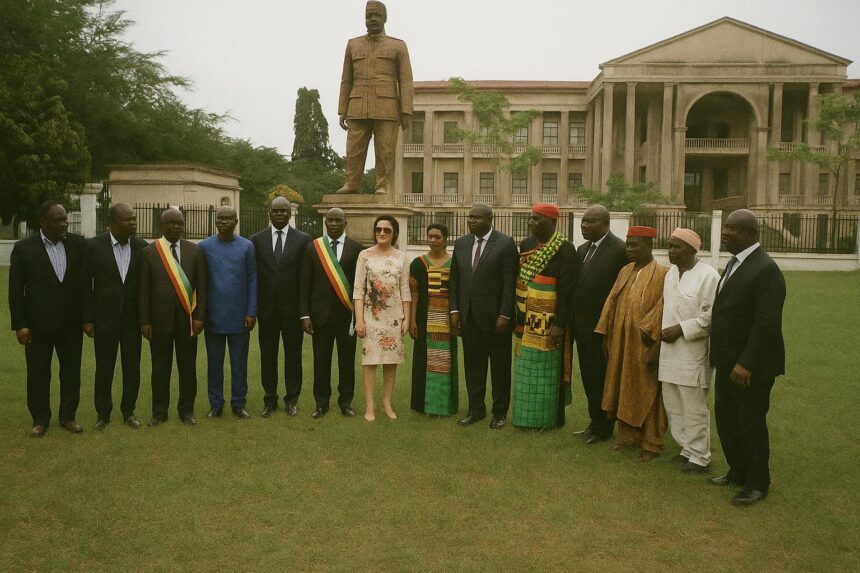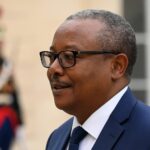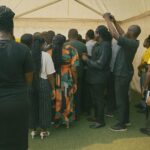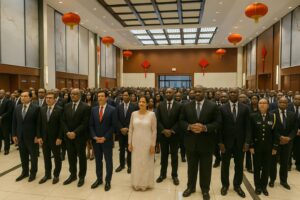Symbolic diplomacy in the heart of Kinkala
Beneath the still morning light of Kinkala’s administrative square, the freshly polished monument to André Grenard Matsoua now glints with a renewed authority. The towering concrete structure, long regarded as a silent sentinel of anti-colonial resolve, received an official homage led by Prefect Jules Mounkala Tchoumou on 22 July. Political observers read the ceremony as more than municipal housekeeping; it is an act of diplomatic symbolism that reasserts the Pool department’s place in the national narrative of cohesion and modernisation (Agence Congolaise d’Information, 24 July 2025).
- Symbolic diplomacy in the heart of Kinkala
- Restoration as a governance statement
- Architecture that narrates resistance
- Traditional rites meet modern governance
- Planting lemba-lemba for a greener peace
- Pedagogy for the next generation
- Integrating Pool into the national reconciliation mosaic
- From local ceremony to regional signal
Restoration as a governance statement
Since taking office in April 2025, the prefect has prioritised infrastructural order, starting with the very grounds that frame local governance. By directing the cleansing of the prefecture’s premises, he has transformed an often-overlooked garden into a curated civic space. The approach aligns with President Denis Sassou Nguesso’s emphasis on administrative efficacy and decentralised pride, offering a visible sign that public institutions are both functional and historically grounded.
Architecture that narrates resistance
The monument itself is a lesson in architectural rhetoric: a mass of varnished concrete that captures both permanence and aspiration. Its placement at the main gate ensures that every visitor must, quite literally, pass through a memory of resistance before entering governmental halls. Such spatial choreography is common in memorial design from Dakar to Pretoria, yet in Pool it carries an added resonance, given the region’s distinctive history of conflict and recovery (Archives Nationales du Congo, 1962).
Traditional rites meet modern governance
Elders encircled the stèle with incense and invocations, consecrating the site to ancestral guardians. Far from theatrical nostalgia, these rites translate communal legitimacy into the language of state protocol, reinforcing the reciprocal recognition between customary authority and public administration. For foreign diplomats analysing Congo-Brazzaville’s social fabric, the coexistence of these spheres offers a barometer of local stability.
Planting lemba-lemba for a greener peace
In a carefully choreographed gesture, Prefect Mounkala Tchoumou and ceremony patron Belinda Ayessa planted a lemba-lemba sapling. In local cosmology the tree stands for temperance and equilibrium, notions germane to post-conflict Pool. Environmental initiatives increasingly serve as soft-power instruments across Central Africa; by integrating arboreal symbolism into a civic event, the organisers merged ecological consciousness with the vocabulary of peace-building (UN Economic Commission for Africa, 2024).
Pedagogy for the next generation
Ayessa’s pledge to convert the plaza into a living classroom speaks to a broader continental trend: repositioning heritage sites as hubs of youth engagement rather than static relics. Planned didactic panels and guided tours aim to familiarise students with Matsoua’s defiance of colonial repression and his advocacy for dignity—a narrative congruent with current curricular reforms championed by the Ministry of Primary and Secondary Education.
Integrating Pool into the national reconciliation mosaic
The Pool department has, in recent decades, navigated episodic instability. By amplifying symbols of shared history, officials hope to normalise the idea that peace is neither an abstract treaty nor a fleeting ceasefire but a culture anchored in physical landmarks. The ceremony complements the government’s sustained investment in infrastructural corridors linking Pool with Brazzaville and Pointe-Noire, thereby marrying remembrance with economic integration.
From local ceremony to regional signal
For the foreign missions accredited in Brazzaville, the Kinkala event offers a nuanced reading of Congo-Brazzaville’s domestic confidence. By coupling administrative renovation, cultural heritage and environmental stewardship, authorities crafted a message that the nation is at once protective of its past and assertive about its developmental horizon. In the quiet sway of the young lemba-lemba, diplomats could discern a gentle but unmistakable signal: the Pool is open—for dialogue, for investment and, above all, for a future in which concrete memory stabilises societal advance.





















